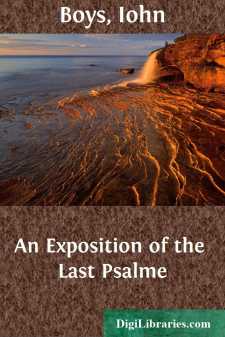Categories
- Antiques & Collectibles 13
- Architecture 36
- Art 48
- Bibles 22
- Biography & Autobiography 813
- Body, Mind & Spirit 141
- Business & Economics 28
- Children's Books 12
- Children's Fiction 9
- Computers 4
- Cooking 94
- Crafts & Hobbies 4
- Drama 346
- Education 46
- Family & Relationships 57
- Fiction 11826
- Games 19
- Gardening 17
- Health & Fitness 34
- History 1377
- House & Home 1
- Humor 147
- Juvenile Fiction 1873
- Juvenile Nonfiction 202
- Language Arts & Disciplines 88
- Law 16
- Literary Collections 686
- Literary Criticism 179
- Mathematics 13
- Medical 41
- Music 40
- Nature 179
- Non-Classifiable 1768
- Performing Arts 7
- Periodicals 1453
- Philosophy 64
- Photography 2
- Poetry 896
- Political Science 203
- Psychology 42
- Reference 154
- Religion 513
- Science 126
- Self-Help 83
- Social Science 81
- Sports & Recreation 34
- Study Aids 3
- Technology & Engineering 59
- Transportation 23
- Travel 463
- True Crime 29
An Exposition of the Last Psalme
by: Iohn Boys
Description:
Excerpt
GVNPOWDER
TREASON DAY.
Psalme 150.
O praise God in his holinesse, &c.
ALL the Psalmes of Dauid are comprised in two words, aHalleluiah, and Hosanna, that is, blessed be God, and God blesse; as being for the greater part either praiers vnto God for receiuing mercies, or else praises vnto God for escaping miseries. This our present Hymne placed as a bConclusion of the whole booke; yea, the beginning, middle, end, to which all the rest (as cMusculus obserueth are to be referred) inuiteth vs in prescript and postscript, in title, in text, in euery verse, and in euery Clause of euery verse to praise the Lord. Teaching these two points especially:
1. For whatGod is to be magnified.2. With whatFor what, vers. 1, 2.O praise God in his holinesse, praise him in the firmament of his power, praise him in his noble acts, praise him according to his excellent greatnesse.aGueuara.bLyra in loc.
cIn loc.
With what, euen with all that is
Without vs, vers. 3. 4. 5. Praise him in the sound of the trumpet, &c.
Within vs, vers. 6. Omnis spiritus, &c. Let euery spirit praise the Lord, praise yee the Lord.
This in briefe is the whole textsEpitomie, I come now to the wordsAnotomie, cutting vp euery part and particle seuerally, beginning first at the first,O praise God in his holinesse. Of which one sentence the Doctors haue many (though not aduerse yet diuerse) readings, especially three:Praise God in his Saints, praise God in his sanctitie, praise God in his sanctuarie.S. Hierome,Augustine,Prosper, anddother as well ancient interpreters as moderne translate here praise God in hisSaints. For if he must be praised in all his creatures, how much more in his new creatures? if in the witlesse wormes, and senselesse vapours, Psal. 148, much more doubtlesse (asTheodorithere collects) in men, in holie men, inSaints, vpon whom hee hath out of hisevnsearchable riches of mercie, bestowed the blessings of theflife present; and of that which is to come.dChrysost. Basil. Euthym. Arabs apud Muscul. Lyra. Hugo Card.Anonymus.eEphes. 3. 8.16.
f1. Tim. 4. 8.First, almightie God is to be blessed for giuing his Saints such eminent gifts of grace for the good of his Church, and for the setting foorth of his glorie. SoChrysostome,Basil,Euthymius,Prosper,Placidus,Parmensisexpound it.gEuery good and perfit gift is from aboue, descending from the father of lights, a good thought in a saint isgratia infusa, a good word in a saint isgratia effusa, a good deed in a saint isgratia diffusa, through his grace which is the God ofhall grace, saints areiwhatsoeuer they are. Wherefore praise the Lord in his Saints, often remember their vertues as their truereliques, and as it were bequeathedklegaciesvnto Gods people. So the wise man, Ecclesiasticus 44.Let vs now commend the famous men in old time, by whom the Lord hath gotten great glorie, let the people speake of their wisdome, and the congregation of their praise.So the Confession ofBohemia, chap....


